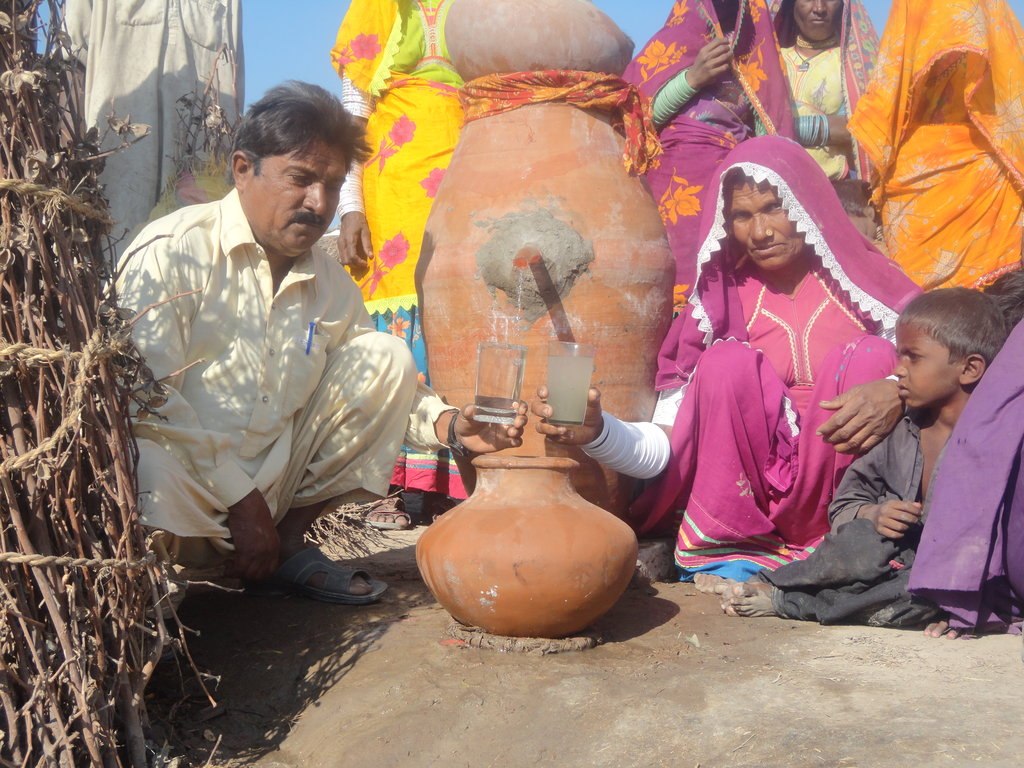Case Study 6.4: Drinking Water through Household-Level Bio-Sand Filtration in Pakistan UN SCAP Policy Manual 2015
Published on by Khurshid Bhatti, Association for Humanitarian Development (AHD) - President/CEO in Academic
Policy guidance manual on wastewater management with a special emphasis on decentralized wastewater treatment systems
AHD Pakistan working to spread safe drinking water Nadi filter. In this regard Bio-Sand Nadi filter case study published in UN SCAP Policy Manual 2015
Case Study 6.4: Drinking Water through Household-Level Bio-Sand Filtration in Pakistan
The Nadi Water Filter is a unique solution to extract potable drinking water from contaminated water at the household level by using everyday objects such as clay pots and sand. This is accomplished by the utilisation of biological water treatment through microbes.
 The advantages of this method lie in its relative simplicity as the filter is easily assembled, there is little or no cost of the materials involved, and its requires low maintenance. It basically involves filling up a clay pot with different sized rocks and sand that will provide the living environment for beneficial bacteria, which in return purify ingested wastewater that can then be used for drinking water after a few days. The only materials needed are a Nadi clay pot, Matka clay, sand, gravel of different mesh sizes, and a rubber tube.
The advantages of this method lie in its relative simplicity as the filter is easily assembled, there is little or no cost of the materials involved, and its requires low maintenance. It basically involves filling up a clay pot with different sized rocks and sand that will provide the living environment for beneficial bacteria, which in return purify ingested wastewater that can then be used for drinking water after a few days. The only materials needed are a Nadi clay pot, Matka clay, sand, gravel of different mesh sizes, and a rubber tube.
One single filter may have tremendous implications for households:
A. It may serve up to 30 people
B. Helps families save USD 5 to USD 10 per month
C. Save cost of travel and transportation
D. Relieve women from fetching water from long distances
E. Helps improve the health of women and children, thereby saving USD 10 to USD
20 per month
F. Helps to save energy by using local materials (AHD, 2012)
Since 2007 the Association for Humanitarian Development (AHD) in Pakistan has installed more than 23.000 Nadi Filters and provided secured drinking water to 2.300 flood-affected families from 2010 to 2013. For its accomplishments, AHD won the Energy Globe Award 2014 (Energy Globe, 2014).
Policy Framework 6.1: Wastewater Methane Mitigation and Recovery Approaches
In the context of climate change, there are several approaches to wastewater methane mitigation and recovery. These are highlighted in the Table 6.
United Nations Economic and Social Commission for Asia and the Pacific (ESCAP), United Nations Human Settlements Programme (UN-Habitat) and Asian Institute of Technology (AIT), 2015. Policy Guidance Manual on Wastewater Management with a Special Emphasis on Decentralized Wastewater Treatment Systems. Bangkok. Thailand
ISBN : 978-974-8257-87-7
Copyright@United Nations and Asian Institute of Technology (AIT) 2015
A free PDF copy of publication can be accessed at
http://www.unescap.org/resources/policy-guidance-manual-wastewater-management
Media
Taxonomy
- Treatment
- Water Management
- Water Governance
1 Comment
-
Much simpler to use and maintain, unbreakble yet easy to transport and mass produce is Terafil Water filters made by us and deployed in most of the Indian states. If anyone interested for giving them in Pakistan, we would love to do so! Chandrasekaran J www.watsan.inchandra@watsan.in